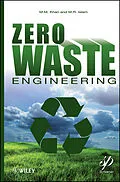Is "zero waste engineering" possible?
This book outlines how to achieve zero waste engineering, following natural pathways that are truly sustainable. Using methods that have been developed in various areas for sustainability purposes, such as new mathematical models, recyclable material selection, and renewable energy, the authors probe the principles of zero waste engineering and how it can be applied to construction, energy production, and many other areas of engineering.
This groundbreaking new volume:
* Explores new scientific principles on which sustainability and zero waste engineering can be based
* Presents new models for energy efficiency, cooling processes, and natural chemical and material selection in industrial applications and business
* Explains how "green buildings" and "green homes" can be efficiently built and operated with zero waste
* Offers case histories and successful experiments in sustainability and zero-waste engineering
Ideal for:
Engineers and scientists of all industries, including the energy industry, construction, the process industries, and manufacturing. Chemical engineers, mechanical engineers, electrical engineers, petroleum engineers, process engineers, civil engineers, and many other types of engineers would all benefit from reading this exciting new volume.
Autorentext
M. M. Khan was recently a lecturer in chemical engineering atthe Bangladesh University of Engineering and Technology, beforemoving to Canada. He has written a dozen papers and coauthored abook on zero waste engineering and sustainable technology.
M. R. Islam is Professor of Petroleum Engineering at the Civiland Resource Engineering Department of Dalhousie University,Canada. He has over 700 publications to his credit, including 6books. He is on the editorial boards of several scholarly journals.In addition to his teaching duties, he is also director of EmertecResearch and Development Ltd. and has been on the boards of anumber of companies in North America and overseas.
Zusammenfassung
Is "zero waste engineering" possible?
This book outlines how to achieve zero waste engineering, following natural pathways that are truly sustainable. Using methods that have been developed in various areas for sustainability purposes, such as new mathematical models, recyclable material selection, and renewable energy, the authors probe the principles of zero waste engineering and how it can be applied to construction, energy production, and many other areas of engineering.
This groundbreaking new volume:
-
Explores new scientific principles on which sustainability and zero waste engineering can be based
-
Presents new models for energy efficiency, cooling processes, and natural chemical and material selection in industrial applications and business
-
Explains how "green buildings" and "green homes" can be efficiently built and operated with zero waste
-
Offers case histories and successful experiments in sustainability and zero-waste engineering
Ideal for:
Engineers and scientists of all industries, including the energy industry, construction, the process industries, and manufacturing. Chemical engineers, mechanical engineers, electrical engineers, petroleum engineers, process engineers, civil engineers, and many other types of engineers would all benefit from reading this exciting new volume.
Inhalt
Preface
Chapter 1. Introduction
Chapter 2. A Delinearized History of Time and Its Impact onScientific Cognition
Chapter 3. Towards Modeling of Zero Waste Engineering Processeswith Inherent Sustainability
Chapter 4. The Formulation of a Comprehensive Mass and EnergyBalance Equation
Chapter 5. Colony Collapse Disorder (CCD): The Case for aScience of Intangibles and Zero Waste Engineering
Chapter 6. Zero Waste Lifestyle with Inherently SustainableTechnologies
Chapter 7. A Novel Sustainable CombinedHeating/Cooling/Refrigeration System
Chapter 8. A Zero Waste Design for Direct Usage of SolarEnergy
Chapter 9. Investigation of Vegetable Oil as the Thermal Fluidin a Parabolic Solar Collector
Chapter 10. The Potential of Biogas in the Zero Waste Mode inthe Cold-Climate Environment
Chapter 11. The New Synthesis: Application of all NaturalMaterial for Engineering Applications
Chapter 12. Sustainability of Nuclear Energy
Chapter 13. High Temperature Reactors for HydrogenProduction
Chapter 14. Economic Assessment of Zero Waste Engineering
Chapter 15. Conclusions and Recommendations
References
